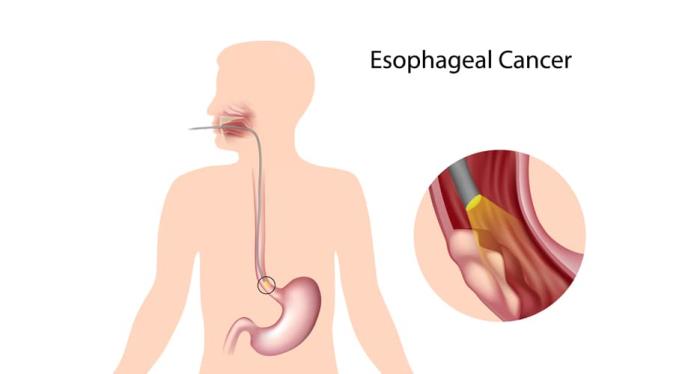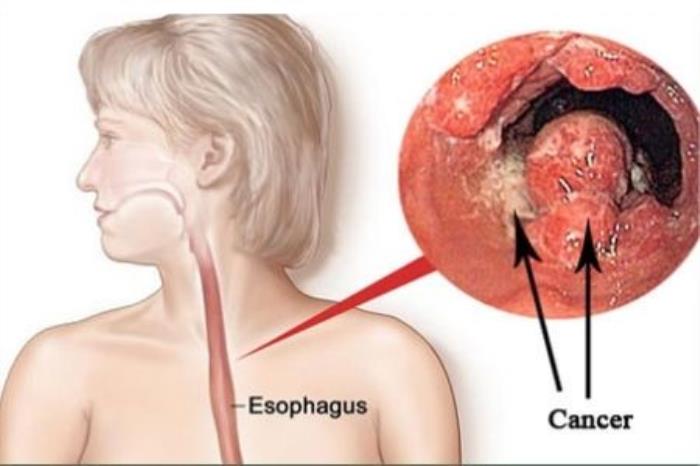Esophageal cancer is a malignant condition that arises in the esophagus, the tube that carries food from the throat to the stomach. This type of cancer can significantly impact both breathing and digestion, leading to various complications. Understanding its implications is crucial for early detection and effective management of the disease.
Medical disclaimer: This content is for general awareness and does not replace a doctor’s consultation. For diagnosis or treatment decisions, consult a qualified specialist.
Types of Esophageal Cancer: Squamous Cell Carcinoma vs. Adenocarcinoma
There are two primary types of esophageal cancer: Squamous Cell Carcinoma and Adenocarcinoma. Squamous cell carcinoma typically originates in the cells lining the esophagus, while adenocarcinoma arises from glandular cells, often related to gastroesophageal reflux disease (GERD). Each type has distinct risk factors and treatment approaches.
Risk Factors Associated with Esophageal Cancer
Several risk factors contribute to the development of esophageal cancer, including smoking, excessive alcohol consumption, obesity, and chronic acid reflux. Additionally, certain dietary deficiencies and genetic predispositions may increase susceptibility, making awareness of these factors vital for prevention.

Symptoms of Esophageal Cancer Affecting Breathing and Digestion
Common symptoms of esophageal cancer include difficulty swallowing (dysphagia), persistent cough, and unintentional weight loss. These symptoms not only affect digestion but can also lead to breathing difficulties as the tumor may obstruct the airway or compress surrounding structures.
How Esophageal Cancer Impacts Digestion
Esophageal cancer can severely disrupt the digestive process. As the tumor grows, it can narrow the esophagus, causing food to become stuck, leading to pain and discomfort. Patients may also experience nausea and vomiting, further complicating nutritional intake.
Breathing Difficulties Related to Esophageal Cancer
Patients with esophageal cancer may experience breathing difficulties due to tumor growth that compresses the trachea or bronchi. This can lead to symptoms such as wheezing, shortness of breath, and even respiratory infections, which complicate the patient's overall health.
Diagnosis of Esophageal Cancer: Tests and Procedures
The diagnosis of esophageal cancer typically involves a combination of imaging studies, endoscopy, and biopsy. Endoscopic ultrasound is particularly valuable for assessing tumor depth and lymph node involvement, which are crucial for staging the cancer.
Staging of Esophageal Cancer and Its Importance
Staging is a critical aspect of esophageal cancer management. The TNM system (Tumor, Node, Metastasis) is commonly used to determine the extent of the disease, guiding treatment decisions and prognostic evaluations. Accurate staging is essential for optimizing patient outcomes.
Treatment Options for Esophageal Cancer
Treatment for esophageal cancer may include surgery, chemotherapy, and radiation therapy. The choice of treatment depends on the cancer stage, location, and the patient’s overall health. Multimodal approaches are often employed to enhance efficacy and improve survival rates.
Role of Surgery in Esophageal Cancer Management
Surgical intervention is often the primary treatment for localized esophageal cancer. Procedures such as esophagectomy involve the removal of part or all of the esophagus, which can significantly improve swallowing and reduce cancer burden, though recovery can be challenging.

Chemotherapy and Radiation Therapy in Esophageal Cancer
Chemotherapy and radiation therapy are frequently used as adjuncts to surgery or as palliative measures in advanced cases. These treatments aim to shrink tumors and alleviate symptoms, thereby improving quality of life for patients.
Managing Nutritional Needs in Esophageal Cancer Patients
Due to difficulties in swallowing and digestion, patients with esophageal cancer often face nutritional challenges. A nutritional assessment and tailored dietary plans are essential to ensure adequate caloric intake and prevent malnutrition during treatment.
Psychosocial Impact of Esophageal Cancer on Patients
The diagnosis and treatment of esophageal cancer can have profound psychosocial effects on patients. Anxiety, depression, and changes in body image are common, necessitating supportive care and counseling to help patients cope with their condition.
Long-Term Follow-Up and Monitoring After Treatment
Long-term follow-up is crucial for esophageal cancer survivors to monitor for recurrence and manage any late effects of treatment. Regular endoscopic evaluations and imaging studies are recommended to ensure timely intervention if necessary.
Advancements in Research and Treatment for Esophageal Cancer
Ongoing research into esophageal cancer is focused on identifying novel therapies and improving existing treatment modalities. Clinical trials are essential for exploring new drugs, targeted therapies, and immunotherapies that may enhance patient outcomes.
Supportive Care and Palliative Options for Advanced Esophageal Cancer
For patients with advanced esophageal cancer, palliative care plays a vital role in managing symptoms and enhancing quality of life. This multidisciplinary approach focuses on physical, emotional, and spiritual support for patients and their families.
Importance of Early Detection and Screening for Esophageal Cancer
Early detection of esophageal cancer significantly improves treatment outcomes. Screening strategies, particularly for high-risk populations, can help identify precancerous conditions such as Barrett's esophagus, allowing for timely intervention and monitoring.
Advances in Esophageal Reconstruction After Cancer Surgery
Reconstruction techniques after esophageal cancer surgery have greatly evolved, offering patients better functional outcomes. Advances in esophageal reconstruction after cancer surgery highlights innovative procedures like gastric pull-up and colonic interposition, which aim to restore normal swallowing and digestive functions.
Managing Swallowing Difficulties in Esophageal Cancer Patients
Swallowing difficulties are a common challenge for esophageal cancer patients during and after treatment. Managing swallowing difficulties in esophageal cancer patients provides insights into therapeutic interventions, dietary modifications, and rehabilitation techniques designed to improve quality of life.
Living with Esophageal Cancer: Coping Strategies
Patients living with esophageal cancer can benefit from various coping strategies, including joining support groups, engaging in mindfulness practices, and maintaining open communication with healthcare providers. These approaches can help manage the emotional and physical challenges of the disease.
Best Esophageal Cancer Treatment in India
The Best Esophageal Cancer Treatment in India involves advanced techniques such as minimally invasive esophagectomy, chemotherapy, and radiation therapy for effective cancer management.
Best Esophageal Cancer Specialists in India
The Best Esophageal Cancer Specialists in India have extensive experience in treating esophageal cancer, offering tailored treatment plans and compassionate care to achieve optimal outcomes.
FAQs about Esophageal Cancer and Its Effects
What are the most common symptoms of esophageal cancer?
The most common symptoms include difficulty swallowing (dysphagia), weight loss, chest pain, and persistent cough. These symptoms can significantly affect both breathing and digestion.
How is esophageal cancer diagnosed?
Diagnosis typically involves a combination of endoscopy, imaging studies, and biopsy to confirm the presence of cancer and determine its stage.
What are the treatment options available for esophageal cancer?
Treatment options include surgery, chemotherapy, and radiation therapy. The choice of treatment is guided by the cancer stage and the patient’s overall health.
Can esophageal cancer be prevented?
While not all cases can be prevented, reducing risk factors such as smoking, excessive alcohol intake, and maintaining a healthy weight can lower the likelihood of developing esophageal cancer.
What is the prognosis for esophageal cancer?
The prognosis for esophageal cancer varies based on the stage at diagnosis and the treatment received. Early-stage detection typically leads to better outcomes.
Discover the Best Oncologists and Cancer Hospitals in India
When it comes to cancer treatment, finding the right specialist and hospital can make a significant difference in the outcome. In this blog, we have compiled a list of the top oncologists and cancer hospitals across major cities in India, ensuring that you have access to the best care available.
Top Oncologists in Major Cities
For those seeking expert oncologists, we have identified the best specialists in key cities:
Leading Cancer Hospitals
In addition to finding the right specialist, choosing the right hospital is crucial for comprehensive cancer care. Here are the top hospitals in major cities:
Get more indepth information on Cancer treatments and their costs
Conclusion
Finding the right oncologist and hospital is the first step in your cancer treatment journey. Explore the links above to learn more about the top specialists and hospitals in your area.
This page provides comprehensive information on managing swallowing difficulties (dysphagia) in patients with esophageal cancer. It covers causes, symptoms, diagnostic methods, and various treatment options, including dietary modifications, swallowing therapy, and medical interventions. Managing Swallowing Difficulties in Esophageal Cancer Patients
This page explores the latest advancements in esophageal reconstruction following cancer surgery. It highlights innovative surgical techniques, improved postoperative care protocols, and emerging technologies aimed at enhancing patient outcomes and quality of life. Advances in Esophageal Reconstruction After Cancer Surgery
Explore esophageal cancer treatment in India, including costs starting from ₹3,00,000, top hospitals, and success rates for better outcomes. Esophageal Cancer Treatment in India: Cost, Top Hospitals and Success Rate